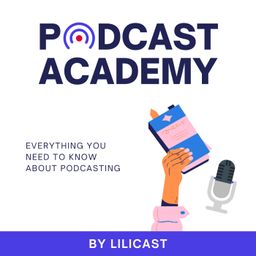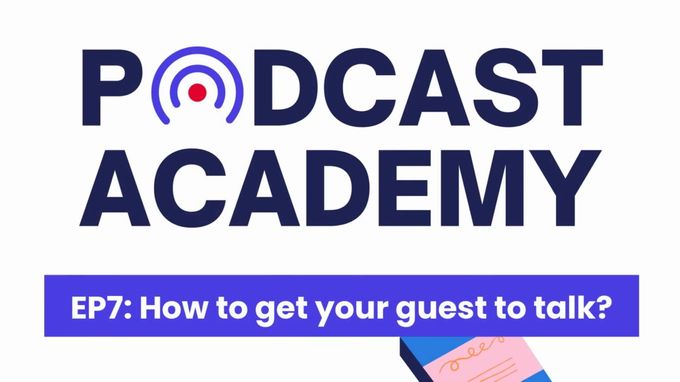
7 - How to get your guest to talk?

Chapters





































Description
(00:00) FIRST CONTACT It all starts from the first contact for an interview to be smooth and interesting. Send a detailed e-mail that gives clear information about how you want to approach your interview. If the answers require some research, figures, references, or simply to give them some time to prepare their answers and arguments, send them your questions when they are ready. It may be less spontaneous, but it will be more informative and complete. (00:29) CHOOSING A GUEST Remember that a good guest does not necessarily have to be famous. Being famous doesn't always mean that you are interesting or that you speak well. So yes, we're not going to lie to each other, it's good for the reputation of your podcast and you can benefit from its fame and followers. But above all, choose a pertinent interlocutor who masters his/her subject. He or she will talk about it easily and enthusiastically. And enthusiasm is contagious, so it will give your listeners something to look forward to. They will thank you for that. (01:03) CLEAR QUESTIONS To get a guest talking, they need to understand where you are going with this. I advise you to work on the framework of your interview. Your guest may have an exciting background, but you can't talk about everything in such a short space of time. Like I have told you: you have to choose the way to proceed with your interview, a common thread, and stick to it. With a beginning, a middle and an end. Another tip: do not ask your interlocutor three questions in one. Don't ask them about their values, current affairs and objectives all at once. For example, don't say: "I think that in your company it's teamwork that's important to you, isn't it? Because I've read that you're currently in the midst of a major upheaval? What are your objectives in regard to this, after all?" That's too many questions at once which can be confusing. Take the time to unfold your questions. And listen to their answers... And once the interlocutor starts, do not cut him or her off. Remember that you are the host of the podcast, not the star. You're there as a gateway and make your interlocutor shine. Let them finish their idea, it's the least you can do. (02:17) CUTTING A CHATTERBOX OFF What can you do with a chatty guest? If the guest gets lost, gets carried away, or monologues, find a way to bring him/ her back on the path you have chosen to take. You may not be the star of the podcast, but you're the one leading the debate. Don't panic as you see the seconds tick. The advantage of podcasting is that it is not live. Don't forget that it has to be edited afterwards and this will save you. Wait for your interviewer to finish his or her thought and, when recording is off, ask your interlocutor to be a bit more concise, otherwise you risk exceeding the time limit and you don't want to cut it off during the editing stage. Flatter them gently but be firm. Don't be overwhelmed by an overconfident guest. A good interview is a collaborative effort. (03:10) TO GET A SHY PERSON TO TALK Second case: the guest who is a little shy in front of the microphone. Don't hesitate to take the time to talk off mic. You can banter, ask him how he is, talk about the rain or the good weather. Make conversation and proceed gently, you will have plenty of time to get to the heart of the matter afterwards Don't hesitate to talk about his achievements to put him at ease. Generally, we are more talkative when we have positive things to say about ourselves. When the interlocutor talks about an important moment in his life, put feelings into it. Ask how he or she felt at the time? How did he or she feel? Was it pride? Pure joy? Has he or she felt this way at other times in his or her life since then? (04:02) RESTART If you've done a good job on your topic and your guest is little known, he or she may have already spoken publicly elsewhere. To give them a clever reminder, don't hesitate to use sentences that they have said elsewhere. This will allow them to deepen their thinking, to deny or confirm their ideas, in any case show your support. In the episode, how to conduct an interview, we tell you about the 5Ws, the five questions every good journalist keeps in mind. Who, What, Where, When, Why? Keeping this sequence in mind allows you to dig deep into a subject and therefore you will never run out of questions when facing a guest. (04:43) ACCEPT SILENCE There may be some silent moments when a guest speaks little. Accept them. It can be difficult when silence is prolonged, it is borderline scary but that silence can say a lot depending on the discussion we are having. Those seconds of silence allow the guest to gather his or her ideas, to allow the rest of reflection to flow smoothly. In any case, give the guest the opportunity to speak again if he or she wants to. At all costs, do not fill in the void too quickly. (05:13) NO DISTRACTIONS It seems obvious, but for a guest to be able to speak freely, he or she must feel good. Avoid distractions, turn off your phone, and any other source of notifications. Be focused on what they are saying. They need to feel listened to, in order to feel like talking. Finally, if the interview is really uninteresting because your guest did not play the game, you can simply not use it. Podcasting offers that freedom. You can decide whether to release an episode or not. But that doesn't mean you've worked for nothing. You'll still learn a few lessons from it. Not the ones you imagined, that's true. But you've learned something and in the life of a podcaster, that's precious. It will allow you, you'll see, to improve yourself.




